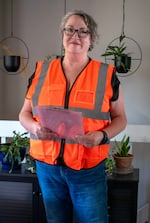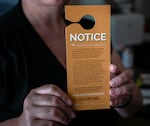From Sherlock Holmes to Veronica Mars, private eye is one of the most glamourized professions of TV and film. But for the approximately 900 Oregonians who are licensed private investigators, it’s not that exciting most of the time.
“There’s a lot of boring stuff that happens where you’re just driving over there to see what’s going on, or calling people up that don’t answer the phone,” said Tea Godfrey, a private investigator and process server based in Milwaukie. She says unlike Sherlock Holmes, she’s not usually running from the hound of Baskervilles in her line of work.
“I don’t usually get my adrenaline pumping too much in this job anymore. I make a point to be safe at all times,” she said.

Tea Godfrey was a paralegal before she became a private investigator. "When you're a paralegal, you can do all these investigating things, but you just don't go out into the field," said Godfrey. She prefers this "I'm not reviewing 10 bazillion pages of discovery, which I hate." Here, she works at her home office.
Julie Sabatier / OPB
Godfrey, a six-foot-tall 59-year-old, switched from the endless paperwork of being a paralegal into private investigator field work a few years ago.
“It’s kind of like going on a treasure hunt sometimes where you’re like, ‘okay, this is the mission and I need to go and figure it out,” She said, adding that, “Some of the best tools you have to do this job are your curiosity and your tenacity.”
For the latest installment of OPB’s “At Work With” series, we ask licensed private investigator and process server Tea Godfrey of Solid Serve Legal your questions on what it’s like to do what she does.
—
Q: What are the licensing requirements for being a private investigator?
“You have to get a background check, you have to get paperwork, then you submit it to the [Oregon Department of Public Safety Standards and Training (DPSST)] department,” said Godfrey.
“I want to say it took two months maybe for them to process the application. The fingerprints have to go out and come back and the background check has to go out and come back. So it takes a bit, and it was almost $800. So it’s not a cheap thing.” There’s also a test, which Godfrey didn’t find challenging “And it is open-book,” she said. “It’s like 50 questions, but really the whole purpose is to test your ability to find answers. So, it’s not like you have to memorize this stuff.” Instead, the test focuses on your ability to do research on the law.
To get licensed, it requires a certain amount of experience doing investigative work. Historically, most private investigators have been retired law enforcement. But, the field is increasingly made up of people from different backgrounds that require investigation, like private security and paralegal work.
Do you wear disguises? Do they always work?
“I have a safety vest, like the people who are working in construction. I will wear it from time to time if I’m really having a hard time getting somebody to answer the door.” The safety vest is a way to disguise yourself but stay within the law, according to Godfrey. “The law says we cannot pretend to work somewhere if we don’t actually work there. [The vest] doesn’t have any names on it at all,” she said. “I use it for a couple different reasons. If I’m out on an investigation for a car accident, for example, I’ll put that thing on because it makes me visible measuring things with my little roller stuff, and I don’t want to get hit by a car,” said Godfrey. “But it makes people more willing to talk to you, not some random stranger.”
The vest is best paired with a clipboard, in her experience. “My disguises are to carry a clipboard when I’m serving,” she said. “That’s been the best disguise for me is to just have it on a clipboard. And then people think, oh, it’s official.” But Godfrey doesn’t wear any wigs or masks. “No wigs. I don’t need wigs. I mean, so that would be like Superman. If you saw me with my regular hair and then you saw me with a wig on, you would not think I was a different person. I’m six feet tall, okay? I have to wear these glasses. I don’t have contacts. It’s not going to make much of a difference if somebody’s already seen me.”

Instead of wigs and masks, Tea Godfrey finds that safety vests and clipboards are the best way to get people to answer the door. “The best disguise for me is to just have it on a clipboard. And then people think, 'oh, it’s official.'”
Lillian Karabaic / OPB
Have you ever felt fear for your life as a result of your job?
“If I know I am trying to serve a restraining order on somebody who’s been shooting their gun at the neighbors and has a dog, then I will bring a dog treat and also not be in the line of sight for that.” “But I had one of those out in Estacada, I finally got it,” said Godfrey. “It was an older woman. She was older than me, and she would get drunk and shoot her gun at the neighbors. And it’s not always super dangerous. But there have been process servers who’ve been shot and killed, not necessarily in Oregon, but definitely hurt in Oregon because people either hit them with their car or did something with a dog,” said Godfrey. “It can be a dangerous job. You have to be situationally aware. You have to be in the present moment.”
Does being a middle-aged woman ever help or hurt your work?
“It totally [helps]. Nobody ever suspects me of doing anything nefarious. I mean, it’s funny. Everybody always complains about ‘I get to be a middle-aged woman and nobody pays attention to me.’ But even though I’m six feet tall, people still ignore me.”
There’s been a shift in the gender makeup of the profession. “If you were to go to the Oregon Association for Licensed Investigators Conference, you would see that it’s about 60% women,” she said. National statistics show that about 43% of private investigators in 2023 were women. That wasn’t always the case. Two decades earlier, men outnumbered women in the field 2-to-1.
“I had to serve a gentleman who owns a couple of THC establishments and he was never home,” recalled Godfrey. “The way that I found him was by going to one of the stores and pretending that I knew him and talking to the person behind the counter and they told me all kinds of stuff about him because I was just, ‘is so-and-so here? I wanted to say hi, you know’ People will tell me all kinds of things. It’s great,” she said.
Did you ever get spotted by the target, and how did you get out of it?
“No, I haven’t. Typically, I’ve hidden behind hedges.”
Do you get access to cool tech?
Godfrey has access to special databases only available to licensed investigators. “You have to go through a vetting process. You have to be a licensed investigator. You have to have somebody come out and inspect your office and make sure that it’s secure and that not just anybody can hop on and use your login.” Investigator databases are not same as the law enforcement database, though. In terms of other cool tech, she has small recorders, and measuring devices for intersections.

At six feet tall, fitting into the car for long private investigator surveillance missions can be tough. Tea Godfrey will often sit in the back seat and cover the front windows.
Lillian Karabaic / OPB
What type of cases do you work on?
Private investigators can work on many different types of cases. There are even maritime private investigators, who specifically investigate crimes that happen on the high seas.
One of the greatest needs in Oregon right now are criminal defense investigators, who work for defense lawyers. “The attorney needs an investigator to go and double check all of these things and make sure that things were done properly. A lot of times they weren’t,” she said. “So you’re trying to really not just interview the client, who is the defendant in the case, but interview the witnesses if there are any. Try to find surveillance video. Did we get all of the body cam footage from the police? A lot of times it’s just kind of going through and double-checking.”
Tea Godfrey mainly handles civil litigation cases rather than criminal matters, like personal injury or family law. “When somebody gets in a car accident and they get a police report, and the police report says very little about what actually happened. They try to take down all the witnesses’ names and numbers, but sometimes they write those numbers down wrong,” explained Godfrey.
“It’s my job to go out and interview the witnesses and actually look at the location, figure out all the different things that might’ve impacted it,” she said. “What kind of weather was it at that particular date and time? Were there any events going on in the area? Is there any surveillance video that might be had?”
Godfrey warns that if you need to hire an investigator, it’s crucial to act quickly because evidence deteriorates or disappears altogether. “A lot of times I will get a request to interview witnesses on an accident that happened almost a year ago,” she said. She has to explain, “I’m so sorry, but there’s not going to be any video. Even if there is video that was pointing in that direction, it’s not going to be there anymore.”

Tea Godfrey puts this notice on the door of people she needs to serve with papers, and most people call back. "What I usually tell people is my job is to protect your constitutional rights. If nobody serves you, the court can still move the case forward without you being involved. And if that happens, your rights are gone. You get an automatic judgment against you. You have no option to respond. You don't know what's going on. And nobody wants that. And I don't think people understand that. So when I explain that just you evading me is not going to make this go away, they're usually pretty happy to talk to me."
Lillian Karabaic / OPB
Do private investigators surveil cheating spouses?
Godfrey isn’t a fan of cases investigating cheating spouses — in fact she tries to talk people out of hiring any investigator. “Because the first question is, okay, once you find out what are you going to do? Are you going to go to counseling? Maybe you should just start with counseling,” she advised. “If you think that your spouse is cheating, you’re probably right. Please don’t spend $5,000 on surveillance,” she said. “Take that money and go on vacation, get a divorce. This is Oregon. It’s a no-fault divorce state unless you have a prenup. [..] You don’t need to know for sure.”
Any TV detectives that are realistic?
“I really like Bosch. He’s a police detective, but then he exits the police and becomes an investigator,” she said. “I think it’s very realistic what they have to do. There’s a lot of boring stuff that happens.”

Tea Godfrey's tools of the trade as a private investigator.
Lillian Karabaic / OPB
Is being a private investigator ever funny?
“I mean, I feel like sometimes I try not to take myself too seriously, but it is serious when you’re trying to protect people’s constitutional rights,” said Godfrey. “And they’re not, especially if you’re trying to serve a protective order and somebody’s in danger. That’s not funny.”
“But there’s a comedy of errors when you’re communicating with maybe your client or something, and they said one thing and you heard another, and it kind of snowballs sideways. Thankfully, that doesn’t happen too often. But yeah, it makes me laugh instead of cry,” laughed Godfrey.
What kind of person would be good at your job?
“Anybody who is not afraid to talk to strangers! I don’t think you need any specific background as long as you’re willing to find somebody who can train you and mentor you,” she said. “The things that you really need are curiosity and tenacity. And maybe some computer and tech skills.”
What’s the best part of your job?
“The best part of my job is when I actually get to help somebody who really, really needs help with a protective order, or getting a client served where nobody else has been able to get them served. I’m the third or fourth person they’ve tried and I get ‘em. And so I didn’t think I would ever specialize in being the person who could do hard-to-serves. But, like I said, you have to be curious and tenacious and you just follow every lead,” she said. “And don’t be afraid to call people and email them, bug the crap out of them.”
